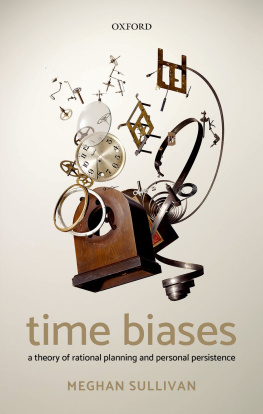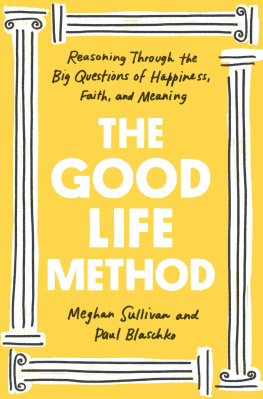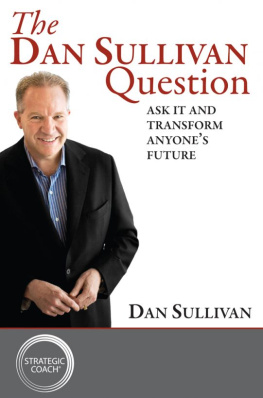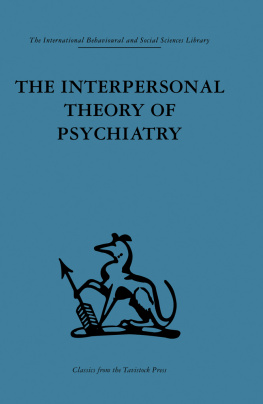Sullivan Meghan - A Theory of Rational Planning and Personal Persistence
Here you can read online Sullivan Meghan - A Theory of Rational Planning and Personal Persistence full text of the book (entire story) in english for free. Download pdf and epub, get meaning, cover and reviews about this ebook. year: 2018, publisher: Oxford University Press USA - OSO, genre: Romance novel. Description of the work, (preface) as well as reviews are available. Best literature library LitArk.com created for fans of good reading and offers a wide selection of genres:
Romance novel
Science fiction
Adventure
Detective
Science
History
Home and family
Prose
Art
Politics
Computer
Non-fiction
Religion
Business
Children
Humor
Choose a favorite category and find really read worthwhile books. Enjoy immersion in the world of imagination, feel the emotions of the characters or learn something new for yourself, make an fascinating discovery.
- Book:A Theory of Rational Planning and Personal Persistence
- Author:
- Publisher:Oxford University Press USA - OSO
- Genre:
- Year:2018
- Rating:3 / 5
- Favourites:Add to favourites
- Your mark:
- 60
- 1
- 2
- 3
- 4
- 5
A Theory of Rational Planning and Personal Persistence: summary, description and annotation
We offer to read an annotation, description, summary or preface (depends on what the author of the book "A Theory of Rational Planning and Personal Persistence" wrote himself). If you haven't found the necessary information about the book — write in the comments, we will try to find it.
A Theory of Rational Planning and Personal Persistence — read online for free the complete book (whole text) full work
Below is the text of the book, divided by pages. System saving the place of the last page read, allows you to conveniently read the book "A Theory of Rational Planning and Personal Persistence" online for free, without having to search again every time where you left off. Put a bookmark, and you can go to the page where you finished reading at any time.
Font size:
Interval:
Bookmark:


Great Clarendon Street, Oxford, OX2 6DP, United Kingdom
Oxford University Press is a department of the University of Oxford. It furthers the Universitys objective of excellence in research, scholarship, and education by publishing worldwide. Oxford is a registered trade mark of Oxford University Press in the UK and in certain other countries
Meghan Sullivan 2018
The moral rights of the author have been asserted
First Edition published in 2018
Impression: 1
All rights reserved. No part of this publication may be reproduced, stored in a retrieval system, or transmitted, in any form or by any means, without the prior permission in writing of Oxford University Press, or as expressly permitted by law, by licence or under terms agreedwith the appropriate reprographics rights organization. Enquiries concerning reproduction outside the scope of the above should be sent to the Rights Department, Oxford University Press, at the address above
You must not circulate this work in any other form and you must impose this same condition on any acquirer
Published in the United States of America by Oxford University Press 198 Madison Avenue, New York, NY 10016, United States of America
British Library Cataloguing in Publication Data
Data available
Library of Congress Control Number: 2017959737
ISBN 9780198812845
ebook ISBN 9780192542120
Printed and bound by CPI Group (UK) Ltd, Croydon, CR0 4YY
Links to third party websites are provided by Oxford in good faith and for information only. Oxford disclaims any responsibility for the materials contained in any third party website referenced in this work.
You are timebiased if you have systematic preferences about when events happen. For instance, you might prefer to spend your tax return now rather than save it for a rainy day, believing full well that if you put it in savings, it would increase in value. This is a near biascaring less about the experiences money can buy when they are scheduled further in the future. You might prefer that a painful root canal scheduled for tomorrow was already over and done with. This is a future bias caring less about an unpleasant experience when its past. You might prefer that the best part of a vacation come at the end rather than the beginning. This is a structural biascaring about the temporal sequence of your experiences. You might even have preferences about when events outside of the confines of your life happen. Perhaps you now prefer that environmental crises happen a long time after your death rather than in the next few generations, because imminent catastrophes would diminish the meaning of your projects. This is a kind of meaning biascaring about when your life occurs in relation to other events.
Philosophers, economists, and social psychologists have tended to treat these time biases in a piecemeal fashion, offering different theories of the origin of such attitudes, different theories of how to measure their extent, and different verdicts on whether these various time biases are rational or irrational. But in this book, I will argue that our time biases are far more similar than we have acknowledged. And there is good reason to think that all time biases are irrational. Learning to recognize and overcome our irrational time preferences can help us become better planners. Indeed, if Plato is right, overcoming our time biases might even save our lives.
The book is divided into three parts. The first part () will focus on whether it is rational to care less about events that would happen in your distant future. Many social psychologists and philosophers simply assume that near bias is a pervasive but irrational attitude. But why is it wrong to care less about the distant future? I will isolate two philosophical arguments for why near bias is irrational and defend the arguments against objections. In the process, I will also offer a theory of rational egoistic concern.
The second part () will consider whether it is rational to care less about some events just because theyve already happened. This attitude, while common, has been largely ignored by social psychologists and philosophers. I will offer a theory of what it is to discount your past, and then argue that such a time bias is irrational for the same reasons it is irrational to be nearbiased.
The final part () will develop a theory of why we are timebiased even though we shouldnt be. I will explain what is (and, more importantly, isnt) entailed by temporal neutrality. And I will show how this theory can help us in determining when to stick to our past plans, in planning for the future in the face of radical change, and in understanding the meanings of our lives even if none of our plans make a permanent difference to the world.
If your curiosity is piqued and youd like to get straight into the debates about time biases, you can skip ahead to the first chapter. But some readers might be interested in a preview of the kind of rationality at play in these debates. The rest of this Introduction will describe the type of rationality that I am interested in, contrast it with some other common approaches, and then introduce the three main principles of rational planning that will reappear throughout the book.
This is a book about what you have most prudential reason to prefer and the extent to which temporal considerations should affect these preferences. Some philosophersand many economiststhink we ought to take our preferences as the fundamental inputs to a theory of rationality. On this view, there is no particularly deep question of why you have the preferences that you do. We just take it for granted that you have some preferences and then ask whether your set of preferences, taken as a whole, is logically consistent at a particular time. For instance, suppose Sparky the pyromaniac reports that right now he prefers blowing up cars to slowly burning them. ButSparky immediately continuesright now he also prefers slowly burning the cars to blowing them up. The minimalists will deem Sparky irrational for having contradictory preferences. But they remain silent on whether there is anything irrational about wanting to torch vehicles in the first place.
We often have good reason to make sure our preferences conform to logical constraints. But we omit an important dimension of rationality if we take individual preferences to be immune from criticism. Rational beings can and should deliberate about what preferences they ought to have. And in deliberating about the reasons that back our particular preferences, we often come to realize that some of our preferences are irrational. For instance, I might start off the electoral year preferring that Bernie Sanders win the 2016 primary rather than Hillary Clinton, with little reflection on my reasons for this preference and not having formed any other electoral preferences. I find that I just like Bernie. This preference is logically consistent. But I might nevertheless find myself learning more about the various candidates platforms and on the basis of new reasons come to prefer that Clinton win. There is an important sense in which my preferences are more rationally justified after this research and deliberation. And this improvement need not be explained as my preferences better cohering within some formal framework or with any of my other preferences. It has to do with my uncovering the reasons for what I should want. Philosophical reflection can help us uncover reasons for and against our preferences in just this way, and your preferences are more rational to the extent that they are better supported by reasons and less susceptible to bias.
Font size:
Interval:
Bookmark:
Similar books «A Theory of Rational Planning and Personal Persistence»
Look at similar books to A Theory of Rational Planning and Personal Persistence. We have selected literature similar in name and meaning in the hope of providing readers with more options to find new, interesting, not yet read works.
Discussion, reviews of the book A Theory of Rational Planning and Personal Persistence and just readers' own opinions. Leave your comments, write what you think about the work, its meaning or the main characters. Specify what exactly you liked and what you didn't like, and why you think so.













